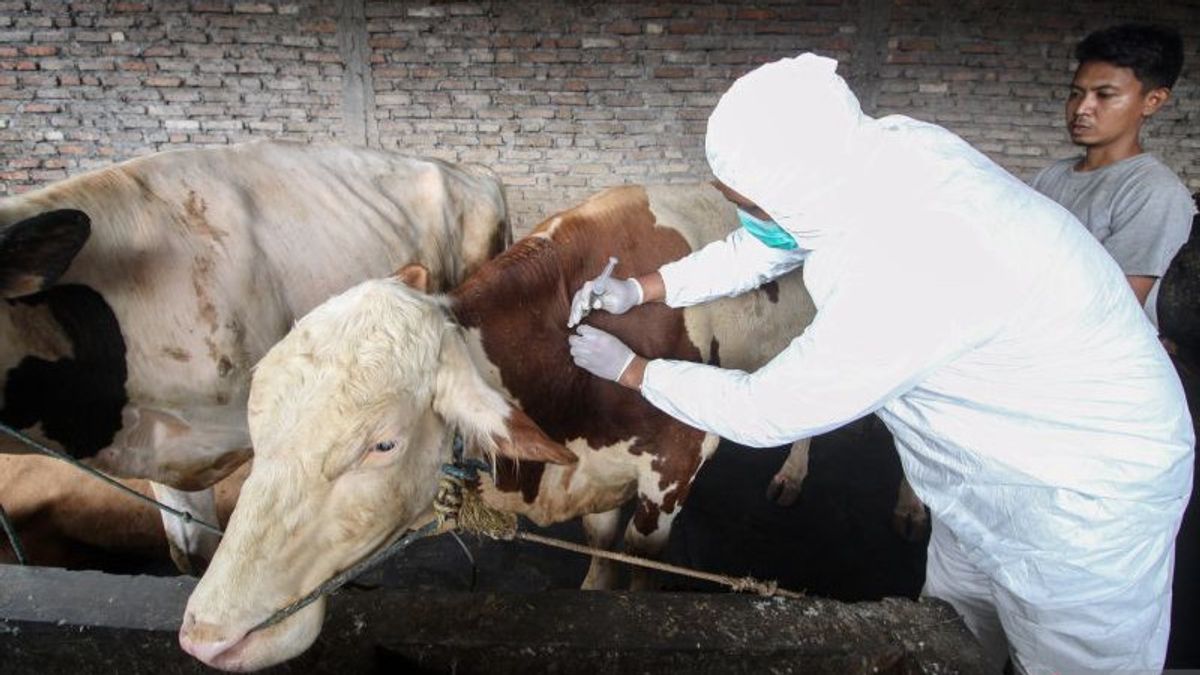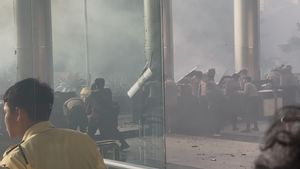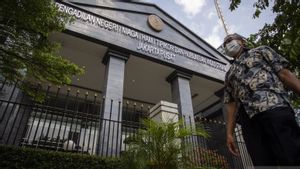JAMBI - A total of 12 cows in Batanghari, Jambi Province which were indicated to have mouth and nail disease (FMD) were forcibly slaughtered.
Head of the Animal Health Division at the Plantation and Livestock Service Office of Batanghari Regency, Drh Tuanku Hifiq, said that the slaughter was carried out considering the level of disease was not severe so that the meat was still fit and safe for consumption.
"There were 25 cases of animals that were indicated to have FMD in Batanghari and 12 of them were decided to be forcibly slaughtered on the conditions of feasibility and safety for consumption," said Hifiq in Muarabulian, quoted from Antara, Wednesday, June 15.
A number of animals that indicated FMD were also brought back to the area of origin of the shipment, while the Batanghari Regency Government had closed the Muarabulian Animal Market after the finding of FMD cases in several animals that were entered and traded in that place.
In general, said Hifiq, the development of handling cases of FMD in livestock in the region is getting better.
He said, after 23 findings of PMK cases in the area, six of them had been declared cured.
"There are 23 indicated cases of animals, six of which have been declared cured, then 12 were forced to slaughter (conditionally, ed.) and five are still under surveillance," he said.
He said the findings of the PMK case were spread across three sub-districts in Batanghari Regency. "The most commonly found currently livestock exposed to FMD are in Muara Tembesi District as many as five tails," he said
Until now, his party continues to strive for local areas free from PMK.
Procurement scenario
The Jambi City Government has prepared a scenario for the procurement of cattle and other livestock and the process of examining sacrificial animals and beef cattle that will circulate in the area, to anticipate the spread of PMK.
Jambi Mayor Syarif Fasha said his party had made a supervisory mechanism, in which every supplier of livestock that would import cattle to Jambi City had to coordinate with the Jambi City Agriculture and Livestock Service and an integrated team involving vertical agencies.
"The flow is that every incoming livestock animal must attach a proper or healthy letter from the relevant agency, namely the district health office of the livestock origin. Then the animals brought to Jambi City are reported to the Jambi City Agriculture and Livestock Service," he said.
Furthermore, the agency and task force will visit the supplier to carry out veterinary inspections. If it is declared healthy according to the recommendations, the livestock deserves to be removed. However, if it is indicated to have PMK, it will be quickly separated. Furthermore, samples of livestock indicated by PMK will be taken and samples will be sent to the testing center in Bukit Tinggi, West Sumatra.
For slaughter, it must be carried out at the Animal Slaughterhouse (RPH) of the Department of Agriculture and Livestock. However, if you want to carry out the slaughter outside the RPH, you will be accompanied by a RPH team so that during the celebration of the sacrifice, all the sacrificial animals have gone through the inspection by the Agriculture and Livestock Service Task Force team, and will be distributed to each mosque or community.
"No group or community can buy cows, goats and buffalo without the knowledge of the task force. There are clear sanctions," he said.
He said that business actors who supply sacrificial animals have also stated that they are ready to cooperate and that livestock are ready to be examined. If there are business actors who are not cooperative, then they are not allowed to make meat buying and selling transactions while the animal is suffering from FMD.
Fasha also appealed to the public not to panic about PMK.
He ensured that all sacrificial and slaughtered animals sold in Jambi City were healthy and fit for consumption.
"Actually, it is also not harmful to humans because we process this beef at high temperatures. This FMD will die at a temperature of 30 to 70 degrees. For humans it is safe unless eaten raw," he said.
The English, Chinese, Japanese, Arabic, and French versions are automatically generated by the AI. So there may still be inaccuracies in translating, please always see Indonesian as our main language. (system supported by DigitalSiber.id)








